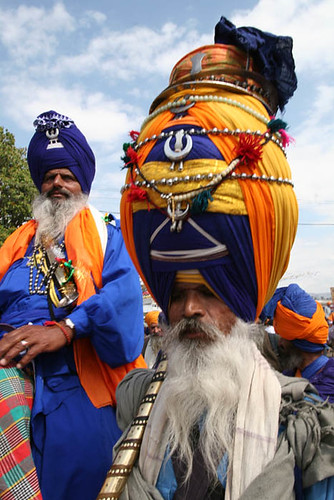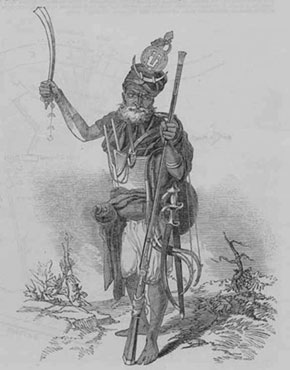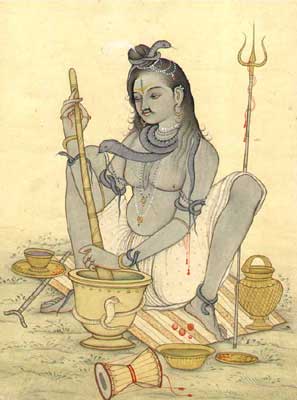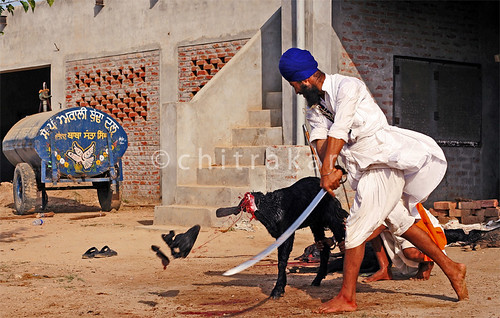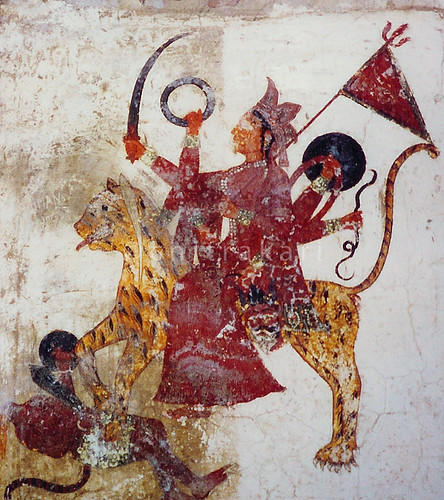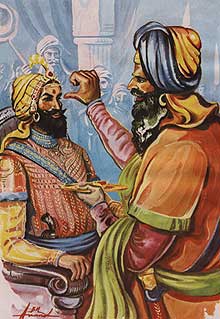Harjas Ji: You talked about the roots of Sikhism, implying (unless I misunderstood) the upanishads. Are you suggesting that this source would influence Sikhi more than the milieu within which Sikhism grew in its early stages?
ਨਾਹਮਹਿੰਦੂਨਮੁਸਲਮਾਨ॥ਅਲਹਰਾਮਕੇਪਿੰਡੁਪਰਾਨ॥੪॥
I am neither a Hindu, nor a Muslim.My body and soul belong to Him, who is called God of Muslims and the Lord of Hindus.
Harjas
You never addressed my point about historical, sociological factors influencing Sikhi. Are you suggesting that this "sanatan dharm" is able to transcend such influences?
I'm sorry my time is extremely busy and I don't always have a chance to write. I addressed several key elements which have nothing to do with the politics and everything to do with the basic theory, definitions, and philosophical structure of Sikh religion from Gurbani and how it directly correlates, almost word for word with Vaishnava Vedanta as well as influence of Shaivite Nath yoga. This isn't an incidental finding. Anyone can choose to ignore, or make a dramatic argument against, but the findings are like archeological bones. No one can make the bones disappear. They have to be accounted for in any realistic and honest inquiry, which is NOT biased by preferred interpretations.
The kind of comparisons between Judaism, which believes in One God to Christianity, which is loosely based on a Jewish Rabbi named Jesus, who was elevated in Greek scriptures (New Testament) to God Himself in human form has no doctrinal relationship. Christianity DID originate from Judaism, and it remains a completely unrelated teaching due to inclusion of Greek and Romanized philosophy and teaching. Islam is also derivative of both these two religions, yet completely different as it incorporates elements of Gnostic Christianity and Arabic beliefs. No one argues how they are related. No one can deny how they are different. But Sikhism has the same exact teaching and philosophy of Vaishnava Upanishads. It's not even a different teaching. What is different are the politicized superficial distortions to make it seem brahminism, caste, worship of demi-gods is the only Hindu philosophy. And this was no doubt done to exagerrate definitions which would stretch Sikhism into a new category. Unfortunately, anyone bothering to actually read Vedas, Upanishads and Puranas can't ignore the incredible similarity with Gurbani teaching.
The greatest example of politicized distortion is using Gurbani translation, I am not a Muslim, I am not a Hindu, when the British word "Hindu" didn't even exist the way it does today when it was written in Gurbani. In so many places in Gurbani a tuuk will say God has this form, blue, 4 arms, long hair... and then seem to contradict, "God has no form." So this shows a philosophy of God being everything and nothing, sargun and nirgun. Guruji writes Naam of God is Allah, Naam of God is Raam, and then says I am neither the people of this area who pray 5 times a day, I am neither the people from this other area who practice pujas, not implying negation, but implying transcendance. Guruji is saying He is not among the people who practice outward forms of religion, but loves all the people who follow the Supreme truth, the union of sargun and nirgun, which is the actual message of mukti in Upanishads. It isn't something belonging to some new category of religion, as if only Sikhs can have mukti. And this is the meaning of including bhagat ban as element of Shri Guru Granth Sahib Ji. They weren't Guru's Sikhs as being formally in Sikh religion. But they were holy God-realized Vaishnava and Sufi bhagats who practiced Naam jaap, either of Allah or of Raam. So this universal message is actually sanatan, and tolerant, like the success of Maharaja Ranjit Singh's kingdom with harmonized Hindu, Sikh and Muslim elements. It bears no resemblance to ethnocentrism of modern Sikh politicized religion which actually shows a sneering disregard and disrespect for Hindu religion and identity, despite denials and professing "no hard feelings." Modern Sikhs are highly offended at being compared to Hindus, because they have been taught for last hundred years to look down on them. These attitudes come from British promotion of the "martial Aryan race and modern non-superstitious nearly Christian Sikh religion." There is woundedness at losing sovereignty of Sikh kingdom, but agitation between Hindu's, Sikhs and Muslims as separate communities has caused nothing but grief. There is nothing spiritual in artificial divisions which are really power struggles and in denial of commonality of authentic spiritual teaching. This is not Sikh identity. It is no building block of independant Sikh "nationhood." It is manipulation and corrupted politics. Why is it Hindu Rajasthanis who have equal martial history and identity as kings and rulers don't have this painful competition and agitation with rest of Hindu population? Because they don't deny kinship. So what exactly is gained by denying kinship? Has independant "Sikh nationhood" been blessed with success? If the God wanted it to succeed, nothing on earth could stop it. Yet, Khalistan was a horrible, ****** disaster. Not only because of corrupt politics of Indian government, but also because of corrupt methods of Khalistanis. To be honest, it is the kind of disaster that made Rwandan massacre happen. This kind of revolutionary rebellion and self-segregation is recipe for future genocidal disasters. Khalsa Raj won't come like this. Khalsa Raj isn't about one group of people dominating others. It will be truly wise and spiritual kings who treat EVERYONE as their own, feed and protect ALL equally. The modern Sikh identity of independant nationhood will prevent Khalsa Raj from ever appearing, because it is at heart a self-serving community after "rights" and political competition, and not a sevadar of the world community. No one will want them as kings with the sense of inflated separatism. So this is completly the wrong philosophy and wrong approach. It is doomed to failure. The only thing that can succeed is unity, commonality, accepting the non-Sikh as part of one's own family.
So when asking if Upanishads have more influence that historical or sociological factors, I would like to rephrase the question with another question:
"If the entire philosophy of Gurbani completely accords with Sruti, the Vedantic word for authority of Vedas, meaning: nothing in Gurbani contradicts or teaches anything new, which is not accepted or reconciled in Puranas, THEN my position is, we are no longer even talking about "influence." If this can be proved, we are talking about a direct teaching. And in this respect, Sikh80's point: "Is Hinduism the mother of Sikhism" must seriously be considered. Because within a certain accepted sect of Hinduism, Vaishnava Vedanta, the very outline of Gurbani originates. If Gurbani teaches word for word definitions, names the same exceptions and clarifications, uses the same Sanskrit terms and teachings, and independantly never teaches anything new, how can Sikhism be considfered "different?" It just becomes another form of the same teaching. And this can be established, not only by analysis, but even through historical references and earliest primary definitions of Sikhism within oldest Jathas as "sanatan."
What appears to be fairly recent, within the last 100 or so years is the Westernized Singh Sabha reform movement which sought deliberate distance from Hinduism and the modern structures of SGPC, Rehit Maryada, and even Akal Takht, the removal of sanatan Nihang Jatha from authority as a Takht and the elevation of Damdami Taksal as a Takht which had not formerly been. So if someone is going to be honest about the modern version of Sikhism as it is followed today, compared to what is recorded historically, there is obvious manipulation and distortion involved. Now that may not concern the average person, who accepts what he is told and doesn't question too deeply. But anyone doing any kind of depth analysis is going to have to admit, that historical and sociological factors are not on the side of Singh Sabha.
I will make an inference, that by alluding to "historical and sociological" factors one means that Guruji "intended" to create a separate religion. Looking at the kes, and the bana, and things like emphasis on One God, WHILE accepting the deliberate distortions of the "extremely well-qualified" Singh Sabha reformers that Hindu's never keep kes, and worship 330 million gods and idols, then superficially, it does appear different.
But let's look deeper.
In every Sikh Jatha, the Khalsa bana is patterned after the Nihang bana. The Nihangs consider themselves sanatan. The Khalsa bana of the Nihang is also called Shiva Saroop, because incredibly close meanings with the demi-god Shiva are associated with it. This alone should give a serious student of history (without preformed opinion) some pause.
WHY would a new religion with an entirely new and separate identity were a uniform based on Shaivite Nath symbolism? Because that alone implies, not influence, but the uniform of Shaivites. It implies direct connection. Here is an example:
Adi chand hundreds of years old shown with Shiva image.
Traditional Nihang Khalsa bana shown in Shiv Saroop.
1846 Akali Nihang Chief
Shiva mixing bhang
Nihang Singh mixing Shaheedi Degh (bhang)
Shaivite sadhu smoking bhang with chillum pipe. Guruji was against smoking, yet a tradition of bhang use exists within the Panth in form of Sukha Shaheedi Degh.
Nihang Singh perfoming Jhatka on goat.
Bear in mind that Shaivite yoga included left-hand Tantric traditions that went against all conventional norms, such as intoxication with bhang, meat eating, and intimate relations, incuding marriage, which is in opposition to traditional Vaishnava monasticism of strict vegetarianism, rejection of all intoxicants, and celibacy.
The Nihang has a jura of hair on his head as does Shiva the Mahayogi.
The Nihand is wearing the Chand (moon) as Shiva does, moreover he is wearing the Adh Chand, which if you look closely is Shiv lingum piercing the Chand yoni.
The Nihang is wearing a farla, piece of blue cloth coming out of the top of dumalla.
It symbolizes the Ganges flowing out of the top of the head, as you can see on the image of Shiva, he also has the Ganges flowing off the top of the head. This is yogic symbolism relating to kundalini awakening, union of Shiva and shakti. The weapons of the NIhang also belong to Shiv symbolism as Shiv is a wrathful deity, or powerful warrior figure who destroys his enemies and conquers death.
Consider the traditional Khalsa weapons, Chakra, swords and kirpans and spears, many shaped in swirling humps like naga serpent spirits. This is fairly common symbolism among Shaivite groups. Consider the origin of Chandigarh and the symbolism of goddess Chandi as found in Shri Dasam Granth bani, sanatan Nihang heritage, as well as assorted historical references, photos, objects such as Sikh battlestandards and the evidence begins to be overwhelming that Sikhism as re-defined by Singh Sabha is NOT the original Sikhism.
So when asking about historical and sociological factors which differentiate Sikhs from Hindus, it seems to be a recent and contrived political identity and not the traditional sanatan identity. "Sikh" means disciple of a Guru. Nowhere does Gurbani say I have started a new religion named "Sikhs." Gurbani simply says, the Turks and the Hindus (people from the Indus Valley) are following falsely (have lost their way). Even the translations of Gurbani force a definition out of Hindu which did not exist during the time Gurbani was written. Guruji, as did all Vaishnava sects, opposed ritualized brahminism as a corruption of spirituality.
Vaishnavism and the Shaivite Nath sects, along with the extremely influenced Sufis all share doctrinal and yogic beliefs and are referred to as the Untouchable religion, because they were part of a reform movement which said the low-caste man who japs the mantra Naam of the God is the real brahmin, not the man born into the caste who is a religious hypocrite. Since both Vaishnava and Shaivite acharas were also militarized and became Armies which fought the Moghuls as well as British, it's easy to trace a historical legacy with the Akali Nihangs. So the comparison between Hindu's and Sikhs modernly which alleges Hindu's are weak, defenseless and pacifistic, and only Sikhs are strong, heroic, warriors and defenders is another distortion and untruth. Just one noest look at Hindu demi-gods and the search for weak, pacifists ends. They are mostly ferocious warriors destroying demons. There were plenty of Sikhs who were traitors after there own gain during time of Sikh Misls. And there were plenty of Hindu sects that were fierce and war-like, most notably, the Hindu Rajasthanis who happened to have been using the surname Singh since the 8th century.



Sikh Battle Standard on display at Lichfield Cathedral (Staffordshire UK), captured by British during the Anglo-Sikh wars.
Link to Sikh Standards
Fresco depicting a scene from Markandey Puraan where Durga crushes Mahikasur (a demon), at the Guru Ram Rai Udasin Akhara at Dehradun, Uttranchal, India
Lithograph of Second Anglo-Sikh War showing Sikh Battle Standard
The modern Britishized Khalsa
Are you suggesting that this source (Upanishads) would influence Sikhi more than the milieu within which Sikhism grew in its early stages?
To rephrase the question, it is the early stages of Sikhism including up until the time of Kingdom of Maharaja Ranjit Singh which was completely sanatan in character, and these original associations and meanings being lost modernly, or deliberately suppressed and denied with flimsy arguments and distorted exaggerations which have created the impression of Sikhism as an independant new religion, when it never taught any new message which is not found in Vaishnava Upanishads, Shaivite Nath tradition or writings of Vaishnava and Nath reform groups such as Kabirpanthis and Sufis. It is not a new and unique message. It is an eternal and timeless message with direct roots in Sanatan Dharam.
Guru is a Guru within an ancient Sanatan tradition. Guru's shishya's are not the name of a new religion, the name means disciples. And anyone with honesty will admit the Guru-shishya relationship is the cornerstone of Vedanta, also known modernly as "Hinduism." Modern Sikhism is a Western, Britishized political invention and definitions completely contradict the written Gurbani of Shri Guru Granth Sahib Ji, Shri Dasam Granth bani, Shri Sarbloh Granth bani and variety of lesser know writings such as Prem Sumerag which average Sikh has no knowledge of due to deliberate suppression by political authorities of Tat Khalsa Singh Sabha movement. Groups like Sikh Missionary Society deny very obvious teachings in Gurbani, such as narak-surag, jamdhootha, reincarnation, yugs, avtaara. They deny the obvious history of janam sakhis by denying miracles were ever associated with Guruji. In short, modern Sikh institutions have succeeded through campaign of deliberate misinformation to create a form of a new religion, but completely disconnected to the powerful symbolism and mysticism of the original.
ਖਤ੍ਰੀ ਬ੍ਰਾਹਮਣ ਪਿਠਿ ਦੇ ਛੋਡੇ ਹਰਿ ਨਾਮਦੇਉ ਲੀਆ ਮੁਖਿ ਲਾਇ ॥੩॥
khathree braahaman pith dhae shhoddae har naamadhaeo leeaa mukh laae ||3||
The Lord turned His back on the high-class Kh'shaatriyas and Brahmins, and showed His face to Naam Dayv. ||3||
ਜਿਤਨੇ ਭਗਤ ਹਰਿ ਸੇਵਕਾ ਮੁਖਿ ਅਠਸਠਿ ਤੀਰਥ ਤਿਨ ਤਿਲਕੁ ਕਢਾਇ ॥
jithanae bhagath har saevakaa mukh athasath theerathh thin thilak kadtaae ||
All of the devotees and servants of the Lord have the tilak, the ceremonial mark, applied to their foreheads at the sixty-eight sacred shrines of pilgrimage.
ਜਨੁ ਨਾਨਕੁ ਤਿਨ ਕਉ ਅਨਦਿਨੁ ਪਰਸੇ ਜੇ ਕ੍ਰਿਪਾ ਕਰੇ ਹਰਿ ਰਾਇ ॥੪॥੧॥੮॥
jan naanak thin ko anadhin parasae jae kirapaa karae har raae ||4||1||8||
Servant Nanak shall touch their feet night and day, if the Lord, the King, grants His Grace. ||4
~SGGS Ji p. 733
ਰਾਜਾ ਰਾਮ ਜਪਤ ਕੋ ਕੋ ਨ ਤਰਿਓ ॥
raajaa raam japath ko ko n thariou ||
Meditating on the Sovereign Lord God, who has not been saved?
ਗੁਰ ਉਪਦੇਸਿ ਸਾਧ ਕੀ ਸੰਗਤਿ ਭਗਤੁ ਭਗਤੁ ਤਾ ਕੋ ਨਾਮੁ ਪਰਿਓ ॥੧॥ ਰਹਾਉ ॥
gur oupadhaes saadhh kee sangath bhagath bhagath thaa ko naam pariou ||1|| rehaao ||
Whoever follows the Guru's Teachings and joins the Saadh Sangat, the Company of the Holy, is called the most devoted of the devotees. ||1||Pause||
ਸੰਖ ਚਕ੍ਰ ਮਾਲਾ ਤਿਲਕੁ ਬਿਰਾਜਿਤ ਦੇਖਿ ਪ੍ਰਤਾਪੁ ਜਮੁ ਡਰਿਓ ॥
sankh chakr maalaa thilak biraajith dhaekh prathaap jam ddariou ||
He is adorned with the conch, the chakra, the mala and the ceremonial tilak mark on his forehead; gazing upon his radiant glory, the Messenger of Death is scared away.
ਨਿਰਭਉ ਭਏ ਰਾਮ ਬਲ ਗਰਜਿਤ ਜਨਮ ਮਰਨ ਸੰਤਾਪ ਹਿਰਿਓ ॥੨॥
nirabho bheae raam bal garajith janam maran santhaap hiriou ||2||
He becomes fearless, and the power of the Lord thunders through him; the pains of birth and death are taken away. ||2||
ਅੰਬਰੀਕ ਕਉ ਦੀਓ ਅਭੈ ਪਦੁ ਰਾਜੁ ਭਭੀਖਨ ਅਧਿਕ ਕਰਿਓ ॥
anbareek ko dheeou abhai padh raaj bhabheekhan adhhik kariou ||
The Lord blessed Ambreek with fearless dignity, and elevated Bhabhikhan to become king.
ਨਉ ਨਿਧਿ ਠਾਕੁਰਿ ਦਈ ਸੁਦਾਮੈ ਧ੍ਰੂਅ ਅਟਲੁ ਅਜਹੂ ਨ ਟਰਿਓ ॥੩॥
no nidhh thaakur dhee sudhaamai dhhrooa attal ajehoo n ttariou ||3||
Sudama's Lord and Master blessed him with the nine treasures; he made Dhroo permanent and unmoving; as the north star, he still hasn't moved. ||3||
ਭਗਤ ਹੇਤਿ ਮਾਰਿਓ ਹਰਨਾਖਸੁ ਨਰਸਿੰਘ ਰੂਪ ਹੋਇ ਦੇਹ ਧਰਿਓ ॥
bhagath haeth maariou haranaakhas narasingh roop hoe dhaeh dhhariou ||
For the sake of His devotee Prahlaad, God assumed the form of the man-lion, and killed Harnaakhash.
ਨਾਮਾ ਕਹੈ ਭਗਤਿ ਬਸਿ ਕੇਸਵ ਅਜਹੂੰ ਬਲਿ ਕੇ ਦੁਆਰ ਖਰੋ ॥੪॥੧॥
naamaa kehai bhagath bas kaesav ajehoon bal kae dhuaar kharo ||4||1||
Says Naam Dayv, the beautiful-haired Lord is in the power of His devotees; He is standing at Balraja's door, even now! ||4||1||
~SGGS JI p. 1105
ਹਰਿ ਭਾਇਆ ਸਤਿਗੁਰੁ ਬੋਲਿਆ ਹਰਿ ਮਿਲਿਆ ਪੁਰਖੁ ਸੁਜਾਣੁ ਜੀਉ ॥
har bhaaeiaa sathigur boliaa har miliaa purakh sujaan jeeo ||
The Lord was pleased as the True Guru spoke; he was blended then with the all-knowing Primal Lord God.
ਰਾਮਦਾਸ ਸੋਢੀ ਤਿਲਕੁ ਦੀਆ ਗੁਰ ਸਬਦੁ ਸਚੁ ਨੀਸਾਣੁ ਜੀਉ ॥੫॥
raamadhaas sodtee thilak dheeaa gur sabadh sach neesaan jeeo ||5||
The Guru then blessed the Sodhi Ram Das with the ceremonial tilak mark, the insignia of the True Word of the Shabad. ||5||
~SGGS Ji p. 923
At the time of Ranjit Singh's coronation at Lahore on 11 April 1801, Baba Sahib Singh placed the tilak or mark of sovereignty on his forehead.
http://www.sikh-heritage.co.uk/
~Bhul chak maaf


